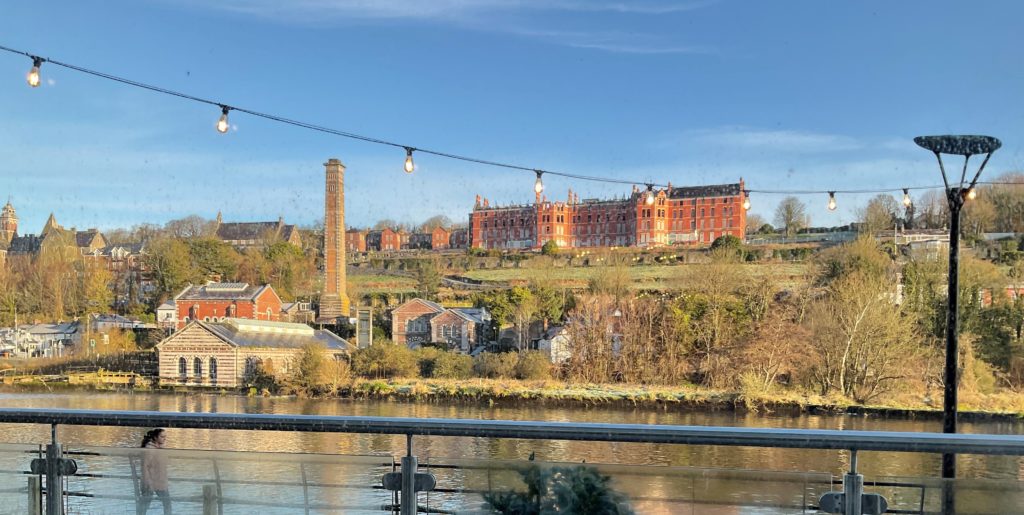
I attended Digifest 2023, in Birmingham UK, and once again spent most of my time in the exhibit hall. In years past (I’ve been attending Digifest since the first one, in 2014 when it was called the “Jisc Digital Festival”), it was because I was exhausted from presenting (either a workshop, a plenary address, or a research paper). But this year it was because I arrived the day before the event and was straight into work mode with jetlag. And, as always, while I enjoy some of the presentations, the opportunity to reconnect with old friends and make new ones is my priority. When I go to the same event over several years (as I did at anthropology meetings, and then in library contexts, and now in edtech ones), the time I can spend talking to people is the most precious part. And what I have missed the most, over the last few years.
I want to capture just a couple of themes that I took away from the event this year.
In the main hall on Day 2, there was a graduate panel–recent graduates working at Jisc in rotations across the organization discussed their experiences and their expectations about working with the organization. Each graduate expressed surprise at all of the different roles in Jisc, and also all of the various roles in universities beyond just lecturers. The invisibility of the work should be concerning. If we are going to be in a situation (as we are now) where students are told that their fees are paying for what they get at university, they should know about how all of the sausage is made. Transparency is key to getting student awareness of the work that goes into their experiences. And the work that might not be directly about students, but nonetheless is still part and parcel of the university. Jisc provides and maintains crucial infrastructure (Janet, eduroam, content licensing). Why is that a secret? Is it that students “don’t need to know?” Or, something else? Are they worried that when something goes wrong, Jisc might get blamed instead of the university? Couldn’t that be an incentive to improve on the work being done, rather than hide altogether?
Conversations in the exhibit hall were never about the tech, but were about the human work of education. The human work isn’t quantifiable, doesn’t show up in rubrics or strategic plans or work plans or whatever, and Isn’t accounted for in teaching hours, or meeting minutes. For example:
- Assessment–that’s what ChatGPT made many of us think about again. All the things that many of us have been saying about assessment since before the pandemic (needs to be more authentic and flexible) and then during the pandemic (needs to be more authentic and flexible) and now that the moral panic over “AI” is happening (NEEDS TO BE MORE AUTHENTIC AND FLEXIBLE)…If we seem repetitive perhaps it’s because there still hasn’t been a widespread and resource-rich attempt to actually tackle assessment in ways that are not proctoring or standardization.
- Labor–once again there were strikes during Digifest, and still not enough discussion about labor issues in education and the impact that labor conditions (underpaid, precarious, pension-poor) has on the sector as a whole: research quality, student experience, teaching practices. The theme this year was “Innovation” and what can innovation possibly look like on the backs of people who barely have time and resources to keep their heads above water? (see our 2019 article Trust Innovation and Risk…it’s still relevant!) Back to the theme of not being listened to I guess. And to the previous point–rethinking assessment takes time and labor that is currently not being funded.
So I have questions about how the work that has been addressing things like assessment and labor get buried and ignored, in favor of talking about shiny tools and tech. And I think it’s notable that recent students were unaware of both the labor that goes into Jisc’s work AND the shiny tools and tech that they are responsible for maintaining/connecting with their labor and funding.
In terms of plenary content, Jisc did good work here: The opening keynote, Inma Martinez,talked about both the shiny tech (machine learning, natural language processing, and AI research) AND about the human responsibilities we have around the development of tech (ethics, transparency, deliberate decision-making independent of the venture capitalists who are trying to sell us this tech). On the second day, Professor Sue Black OBE delivered her own personal narrative, where tech was present but not the most important part of her powerful story. The keynote panel for International Women’s Day highlighted the need to talk about who is working with technology in education just as much as (perhaps more than) the work itself.
But I was left wondering what the impact of these human-centric presentations was, when I witnessed in the Q and A that so many of the questions that were read aloud were about “how do we get people to use this tech?” Insert heavy sigh here. I don’t understand the utility of encouraging people to use tech that was 1) unethically designed 2) not designed for educators or students or vulnerable people of any kind or 3) actually very good at anything but bullshit.
As ever, the human content and concerns were present at Digifest, but were not the message of the event (Innovation!). The noise around ChatGPT in particular sucked a lot of the oxygen out of the room, and makes me wonder what things people might have talked and learned about during sessions and keynotes had their attention not been captured by the AI hype.
Education is a process full of other processes. When we are sold products by people who make claims, we should reorient ourselves to processes. Education isn’t the degree at the end. Writing isn’t the essay at the end. Learning isn’t the test at the end. We need more places and spaces to focus on processes not products. I’d like to see Digifest and other events spending more time discussing and illuminating processes,and the people navigating them.

